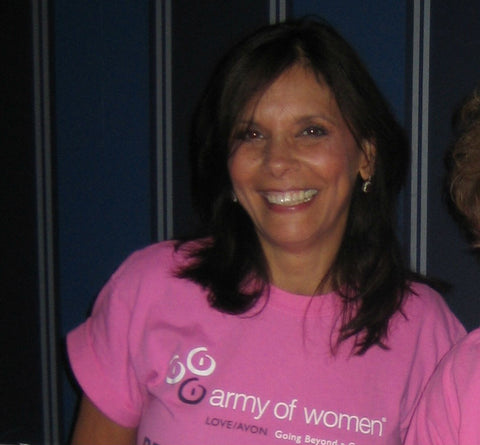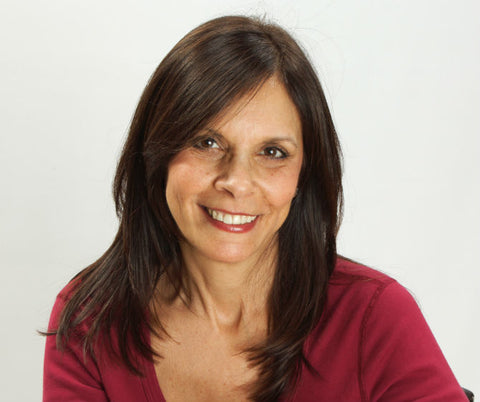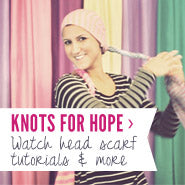AnneMarie From “Chemobrain”


Whether it’s heartfelt anecdotes or inspiring triumphs, the Scarves Dot Net gals love to share stories — especially when they’re incredibly touching. That’s why we’re starting a new series called SDN Spotlight. From influential bloggers to community leaders, we’ve scoured the blogosphere for the most inspiring men and women.
So far, we’ve had the opportunity to hear from six incredible individuals about how cancer has affected their lives.
Today, we’re honored to bring you our interview with AnneMarie Ciccarella. AnneMarie is a native New Yorker, a mom to kids in their 20s, and the oldest of five in a large, close-knit Italian-American family. She is a volunteer for the Dr. Susan Love Research Foundation, and writes about how cancer has affected her life on her blog, Chemobrain.

SDN: Throughout your personal journey, you have become a dedicated activist for different organizations — serving as a Patient to Patient volunteer at Memorial Sloan-Kettering Cancer Center (MSKCC) and getting involved with Love/Avon Army of Women. Can you share a little about these organizations and your role within each?
AnneMarie: I first began volunteering at MSKCC because I was involved in a clinical study being conducted at the hospital. I was four years post-chemotherapy and something wasn’t right. I then realized that it was through the donations of others that made the study even possible. Because of the results of the evaluation, I realized I couldn’t “do numbers” any longer, which presented a problem — I was doing high-level accounting at the time. I felt a bit like Meryl from Bridges of Madison County, asking myself, “What now?”
I then participated in a writing program called “Visible Ink” — which is available to all MSK patients — and again realized it was the time of volunteers that afforded me what has been a life-changing gift. It was my volunteer mentor who helped dust off my writing skills and guided me through the mechanics of launching what was supposed to be a space for me to “unclog” my brain.
Because I had received so much through the generosity of others (with their money and with their time), I began looking at volunteer opportunities for myself at MSKCC. As a Patient to Patient volunteer, I speak with women who are newly diagnosed or still in treatment. There are things that can only be truly understood by someone who has lived through a cancer diagnosis and treatment. I visited patients on the surgical floor, and we have monthly meetings where we discuss many aspects of patient care at the hospital.
I began volunteering with the Dr. Susan Love Research Foundation and the Army of Women (AOW) initiative because I believe in the work of Dr. Love. She is devoting her life’s work to determine the cause of breast cancer. Rather than continue to find ways to kill cancer cells, her approach is different. She wants to understand the cause of breast cancer with the hope that we can ultimately prevent the disease in the first place.
I staff events on behalf of AOW hoping to get more women to enroll in the database. There is a big problem filling clinical studies, and the Army of Women sends out email notifications to let women know when a research study opens and participants are needed. The quicker we fill studies, the quicker we can find answers. People are raising money to fund the studies, but if the researchers can’t fill the studies, in a way, the money is not being used efficiently. An empty lab or a half-filled study still costs money. Research saves lives.
SDN: You are also an advocate for The National Breast Cancer Coalition (NBCC), which has started the Breast Cancer Deadline 2020 Initiative. Can you talk about this initiative and what people can do to help meet this deadline?
AnneMarie: NBCC recognizes that there has been little meaningful progress in decades. They have been instrumental in giving patients a voice at the table when research grants are being reviewed. Because of their efforts, I am a consumer reviewer on the Department of Defense Congressionally Directed Medical Research Program. I had the privilege and honor of being invited to sit on a review panel alongside scientists from many major research centers.
The biggest thing that people can do to help advance the goal of eradicating breast cancer is to do whatever they can to advance research. Take precaution with monetary donations to any organization. If donations are being made for research, always make sure the majority of the donation will be used to fund research.
SDN: On your blog, you often talk about friends who are also battling cancer and emphasize the importance of telling their stories. Can you explain where you find the courage to continuously fight for others, as well as why it’s important to you to share their stories?
AnneMarie: I think telling our stories helps others realize they are not alone, and it helps us to incorporate the reality of a cancer diagnosis into the tapestry of our lives. Not everyone is comfortable sharing in such a public space, but I would hope that anyone with any life-threatening or other chronic illness has at least one person who will listen. I think it’s so important to have our feelings heard and our fears validated.

SDN: Your mother, who is one of your biggest supporters, was declared NED (No Evidence of Disease) — and then things suddenly changed. You mentioned that you were “supposed to be a daughter, not a fearless friend to her.” Could you tell us a little bit more about her and your relationship during her battle with cancer?
AnneMarie: About a year ago, several of us began to refer to ourselves as “fearless friends.” We are breast cancer patients who were diagnosed at early stages. Those with metastatic disease often talk about how they feel isolated. Their reality is often our worst nightmare. They will be in treatment for the rest of their lives, and many of them don’t have the energy to make sure their voices are not lost. The Stage IV patients need to know that those who are advocating for meaningful research are advocating on their behalf, too.
In January, my mom was diagnosed with a late distant recurrence. My mom had two breast cancer diagnoses — the first one was in 1987. She underwent a mastectomy and chemotherapy that was even more barbaric than what is administered today. She was by my side when I was told I had cancer. Just months after I completed my chemotherapy, and weeks after my dad died, a new cancer was found in her other breast. She had a second mastectomy to remove her other breast and was put on an aromatase inhibitor. That was in 2007.
She passed her five-year mark and was still taking Arimidex when our oncologist found a spot on her rib. The biopsy confirmed our worst fears, and I still don’t think I fully grasp the fact that my mom is now a Stage IV patient. She began treatment, and her first scans will be done later this month. Hopefully, this treatment is working and it will continue to work for a long time. She is tolerating it well. Last week, we were scheduled to do an interview together. When I asked her if she would be interested in joining me, we both laughed at her reply: “I can see you are pulling me into your world.” I told her she was already in my “world.”
My mom reads my blog. She’s been my biggest cheerleader since I stepped into social media, and she supports all of my advocacy efforts. When I completely invaded her privacy by sharing her diagnosis on the blog, she was so taken aback by the support and love left in the comments. Every so often, she will email all of her friends and family with a link to something I am doing. I know she sent that blog link to everyone with instructions to “just read the comments.” She was so overwhelmed with gratitude.
SDN: You discussed the misconceptions of lung cancer in a recent post. Are there any other assumptions or misconceptions about cancer and metastatic cancer that you would like to shed some light on?
AnneMarie: Lung cancer is stigmatized, and it is terribly upsetting. With lung cancer patients, they are are often asked, “Do you (or did you) smoke?” More than any other cancer, there is tremendous blame placed on the patient.
With breast cancer, one of the first questions we are often asked is, “Is it in your family?” The truth is, most breast cancers are “sporadic.” There is no BRCA mutation and no family history. Too many incorrectly think that no one dies of breast cancer any more. The annual number of deaths due to breast cancer remains virtually unchanged for decades. Very little of the research is done specifically on metastatic disease.
Cancer is a scary disease, and I think when these questions are asked, on some level, people want to believe there is a reason why we developed cancer. The fact is that while there are many things we can do to reduce risk, no cancer is preventable. So many people do all the right things and still develop cancer. With breast cancer, 30% of those of us diagnosed at an early stage will have our cancer spread. Metastatic breast cancer is terminal. Five years is not a guarantee. Early detection is not a guarantee, but early detection, in most cases, does afford the best shot at a good outcome. There is no place for blame in any of this.
SDN: Your blog, which started as a tribute to your father and a way to relay your medical procedures to close friends and family, has become much more than that. What do you want your readers to take away from reading your blog?
AnneMarie: I hope that those who read my blog realize they are not alone, that there are so many people who are willing to reach out, to share their fears, to celebrate their victories. I hope that readers will learn about their own medical situations and understand they are vitally important members of their medical team.
SDN: You said, “Maybe I’ll make a difference, or not, but doing nothing feels selfish.” Can you give a few examples of ways that others can make a difference?
AnneMarie: We can all make a difference. We can help on a personal level, or we can be part of something much larger than ourselves. Each is equally important. Offer to help if you have a friend that isn’t well. Listen if they want to talk. Don’t ask what you can do since most people won’t know how to answer — instead, call if you are going to the market to see if they need anything. If you have ten dollars to spare, pick up some non-perishable items like paper goods or cereal and just leave the bag at their door. If someone has younger children, ask if you can meet their child at the bus stop or if you can provide a ride for other activities. Offer to drive them to a doctor appointment if you have the time.
Some people prefer to be alone for some appointments, so it’s a good idea to be clear. “I’ll drop you off” or “I’ll be waiting for you in the car” or “Call me when you are finishing up” are good phrases to say. Know that some people do isolate themselves, but don’t stop trying. If you manage to do one small thing to lighten someone’s burden, it’s not a small thing. You’ve made a huge difference.
On a larger scale, there are organizations in almost every community. Grassroots groups depend on volunteers — call and ask if there is something you can do to help. Even if you can only spare an hour each month, every hour helps. We can all help researchers begin to unlock the mysteries by joining Army of Women. If eligible, consider joining a study. The studies being filled are not clinical drug trials; they are observational studies. The success of the researchers will depend upon how much we are willing to help.
Consider enrolling in the Health of Women Study, which is another initiative of the Dr. Susan Love Research Foundation. All women can participate. We have the answers in our bodies, and I can’t think of a better or easier way to make a difference that has the potential to impact so many!
To hear more about AnneMarie’s story and ways you can make a difference, be sure to visit her blog. You can also connect with AnneMarie on Twitter.
Many thanks to AnneMarie for sharing her story with us!
There's no place like home! Take me back to ScarvesDotNet.











